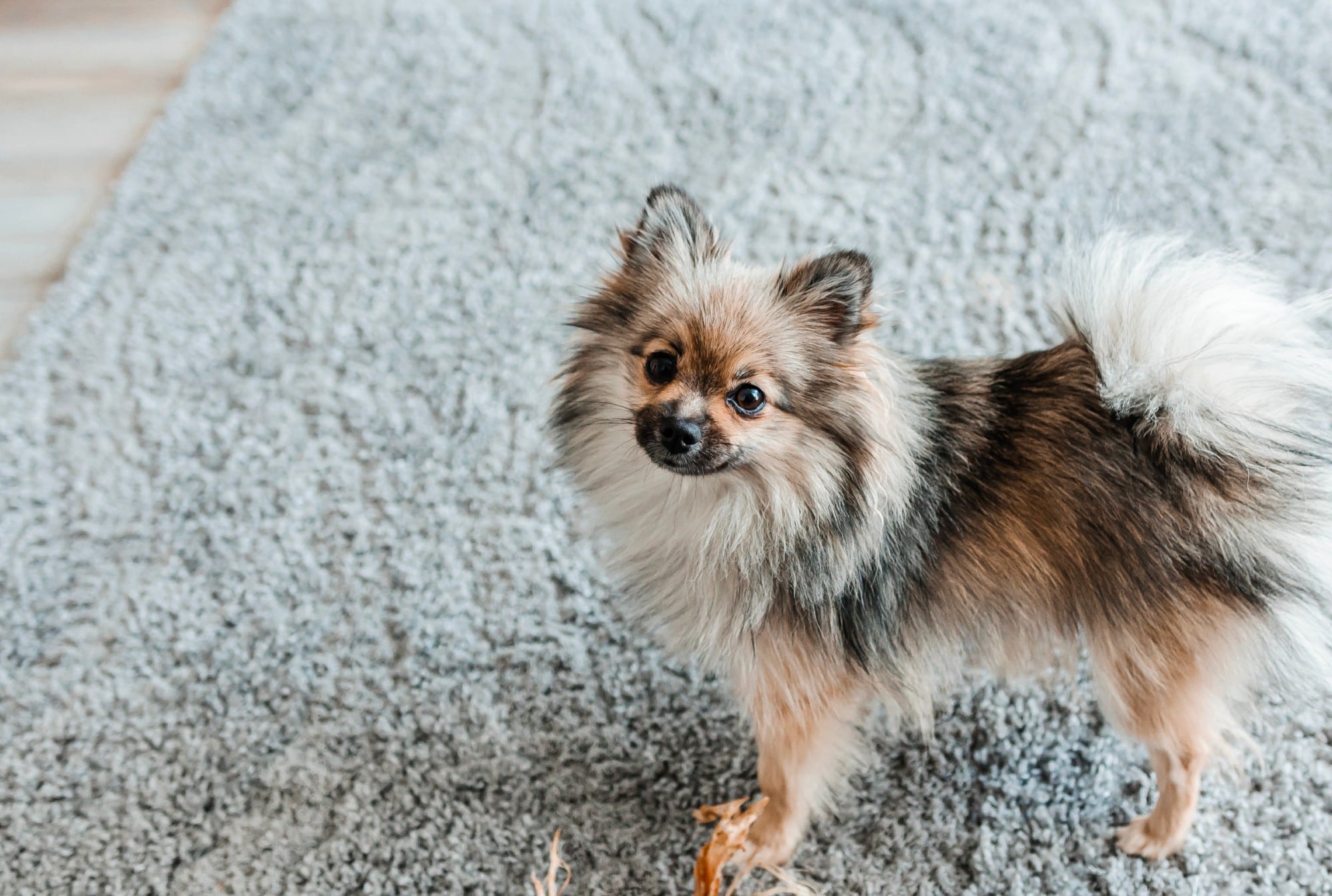The subject of whether you should let your dog sleep in bed with you is highly debated. On one hand, you read all about experts’ horror stories regarding the behavioral problems that come about due to co-sleeping. While on the other hand, you have experts who essentially say, “Have no fear, let your dog sleep near!”
With such conflicting information, we obviously want to be responsible dog parents and do what’s best for our furry friends.
But we can’t help but wonder what kind of consequences does letting your dog sleep with you actually pose? Are they worth the unlimited cuddles? And is there no going back after you’ve let your dog snooze with you?
Related: Mayo Clinic Study Prescribes Sleeping With Your Dog, With a Catch
We gathered several experts’ insights on the matter.
What To Consider Before Sharing the Bed With Your Dog
Before we let Spot snuggle up with us, there are a few factors we must take into consideration. That way, we can avoid any potential challenges down the road.
Related: 7 Tips to Prepare for Your Puppy’s First Night at Home
A Dog’s Age
Is your puppy ready for slumber parties every night?
Joan Hunter Mayer, dog trainer and owner of The Inquisitive Canine, and Torie Silletto, dog trainer and owner of Diamond Dogs, both recommend house training your dog with a crate before giving him the green light to catch some z’s with you. (Because let’s face it: no one wants to wake up to a wet bed!)
Mayer also mentions senior dogs could want their own space, which is something else to be mindful of.
A Dog’s Behavior
If your dog is well-behaved, it’s unlikely co-sleeping will have any effect on that. Although, if your dog has an existing behavioral problem, it’s possible that kind of behavior will transition to the bed.
Jaime Caponetta, dog trainer and owner of Pawsome University, names multiple behaviors that indicate it may not be ideal to invite your dog to join you for bed just yet. These include destructing, urinating, and guarding.
In cases of destruction where a pup is eating pillows, gnawing on wood or ripping the comforter open, Caponetta says the dog may not be ready for that kind of responsibility. This could be attributed to a dog’s young age, potential anxiety, or lack of physical or mental stimulation before bed.
If a puppy is urinating on the bed, it could be due to excitement, inability to hold it, or inability to alert his owner that he needs to potty outside. If the dog is an adult and urinating on the bed, potential reasons for the cause include manic separation anxiety, a UTI, bladder infection, or incontinence. Caponetta advises getting your dog evaluated by a vet to eliminate any potential health-related causes.
The more serious and potentially dangerous issue is guarding, according to Caponetta. This is when your dog views the bed as a resource and feels the need to guard it from you or other animals. If this is the case, Caponetta suggests to “refrain from allowing them up on the bed until things are more in control” and to “never try to demand them to get down or get physically rough.” Doing so tells your dog the bed is a high-value object and that guarding it is the right thing to do. The trick? A guarder can be lured off the bed safely with distractions like a high-value treat or fun activity (e.g. going for a walk, going outside). Also, this behavior may need the help of a trainer.
Silletto suggests contacting a qualified professional trainer if your dog has other behavioral issues (e.g. growling or snapping when approached on other furniture, from a guardian’s lap or being startled awake).
“The dog is not being ‘bratty’ or disrespectful. They simply have an upsetting compulsion they can’t help,” Silletto tells This Dog’s Life.
A Dog’s Breed
Sharing the bed with a Pomeranian is going to be a much different experience than sharing the bed with a Saint Bernard, to say the least!
People and dogs need their own space, Mayer says. The number of humans and dogs, size of bed, size and breed of dog(s) are all major factors to consider.
“A couple sleeping in a queen size[d] bed with a Great Dane might not have enough room, and it might get too warm!” Mayer says. “Whereas, this same couple with a Yorkie could be comfortable.”
And let’s not forget about snoring!
“The brachycephalic breed dogs tend to snore, compared to dogs with longer muzzles. For some humans this might be irritating. But for others, they might appreciate that their dog is sound asleep, happy, and content,” Mayer says. “Oh, and it goes the other way around too. Some humans snore, which can irritate the dog. As evidenced by the dog leaving their humans and finding a quieter place to snooze.”
Related: Need to Give Your Dog a Bath or Good Brush? Here’s How to Not Make It a Complete Disaster.
A Dog’s Cleanliness
Dogs are at their best when they’re rolling around in dirt, splashing their paws in puddles and getting into all sorts of shenanigans when they play. And we love them for it.
However, we may not want a dirty coat and muddy paws all over our clean bed.
“If the dog only knows to sleep with their human, but ends up having too much fun that day and not getting a bath, sleeping arrangements might change that evening. It’s best to teach the dog they can sleep in a variety of places,” Mayer says. “Owners might need to also think about keeping up with grooming if their dog sleeps in the bed all the time — shedding, sand, dirt, the dead critter they rolled in at the dog park, can all end up in the bed. This might be bothersome to some folks but not to others.”
Regularly bathing your dog will not only keep him clean and healthy, but also give him free reign to comfortably sleep wherever allowed.
A Dog’s Routine
Dogs thrive on structure, which is why it’s crucial to decide whether you’d like to share your bed with your dog.
“If guardians are going to allow it, understand that dogs learn and understand routines,” says Mayer. “If the dogs are used to sleeping with you, then all of a sudden they’re asked to sleep elsewhere, the dog might get confused. It might be best to teach the dog to sleep in a variety of locations, so they can be comfortable no matter where they are sleeping.”
Benefits of Letting Your Dog Sleep With You
Where do we even begin?
Simply being around our dogs is good for our health. The Anxiety and Depression Association of America refers to this as “the pet effect.” The pet effect is the human-animal bond and positive impact our furry friends have on us, such as decreased feelings of stress, anxiety, depression, loneliness, and social isolation.
So, there’s no doubting the warmth and cuddles our dogs provide us while we sleep are genuinely beneficial.
“The co-sleeper feels closer to the dog and the mutual bond gets stronger. Due to the amount of time the owner and dog stay together, the positive benefits of dogs for humans increase even more such as excretion of ‘happy’ and ‘love’ hormones like endorphins and oxytocin,” Dr. Margit Gabriele Muller, veterinarian and author of Your Pet, Your Pill®: 101 Inspirational Stories About How Pets Lead You to a Happy, Healthy and Successful Life, says.
And in case you were wondering, sharing the bed with your dog does not disrupt your sleep. A Mayo Clinic study from 2017 discovered that both dogs and humans get satisfactory sleep sharing the bed, which is great news for all us dog parents already sharing the bed with our pups.
Related: Mayo Clinic Study Prescribes Sleeping With Your Dog, With a Catch
If your dog loves sleeping with you and so do you, it’s a win-win for everyone!
Downsides of Letting Your Dog Sleep With You
There are plenty of urban myths out there regarding the drawbacks of letting your dog sleep with you. However, there can be some real downsides depending on your sleep situation and what you’re willing to compromise!
For instance, if you’re a light sleeper and have a restless dog (or vice versa), there’s a good chance one of you may not be the most comfortable if the other is constantly tossing and turning. Bed hogs are equally as difficult to share your sanctuary with, especially if you’re someone who cherishes a good night’s rest.
Muller also reminds us, “It’s not for everybody if the dog snores or is flatulent during the night.”
Sharing the bed with your dog can also require more cleaning and preparation before bedtime.
Your dog (and bedding) may require more washing depending on how dirty your dog gets during his everyday activities. And if you have allergies, you’ll have to maintain your bedding even more so to combat your dog’s shedding. To ensure ticks or fleas don’t make their way onto your bed, you’ll also have to spend more time grooming your beloved pooch.
Related: Meet the Trainer Drake, Carrie Underwood, and Kaley Cuoco Use — And What You Can Learn From Her
So…Should You Let Your Dog Sleep With You?
“You can absolutely let your dog sleep in your bed! They love to be close to their humans, and it’s far comfier than a dog bed or crate,” Silletto says.
Some of her clients ask if it’s okay to let their dogs sleep in bed with them and are often embarrassed to admit they let them due to some of the myths floating around.
“There are no hard rules for how a dog ‘should’ behave and co-exist within your home,” she says. “Train the behavior that bothers you.”
Caponetta agrees. She has let her dogs sleep in bed with her and her husband for years and has never had any issues.
“As a behavioral trainer, I get asked, ‘Is it okay if my dogs sleep in bed with me?’ Usually, my response is, “Sure, as long as we aren’t having any issues surrounding the bed!” she says.
Mayer also believes dogs can share the bed with you. That is, as long as both the human and dog are comfortable with one another and the arrangement.
“It’s important that all parties consent to the arrangement and get good quality sleep. I would venture to say that it would create for quality bonding time — again, as long as all parties are on board with the arrangements,” Mayer says.
In short, it’s entirely up to you!
Training Advice from Experts
A dog is a lifelong commitment. It’s essential to make sure you set him up for success so if there are any changes, he is adaptable and remains happy.
Benefit from Sleeping Close but Separate
If you’ve never shared the bed or cannot share the bed with your dog for any reason, you can still experience the advantages as if you did!

SHOP NOW
Muller recommends having a separate, comfy dog bed in the bedroom but not letting your dog sleep in the same bed as you. (For the sake of boundaries.)
“This will provide you with the benefits of having the dog nearby, including stronger bond, companionship, security, but doesn’t give you the negatives like sleep disturbance, drooling, and hair shedding,” Muller says.
Teach Your Dog to Sleep Anywhere
If you plan on letting your dog sleep on the bed with you, use a targeting technique and discriminative stimulus to get him acquainted with sleeping elsewhere too.
“If owners want their dog to sleep with them in the same bed, one way to minimize confusion is to teach the dog to sleep on a special towel or blanket. This way, if that special item is on the human’s bed, then the dog is allowed on the bed,” Mayer says. “If the blanket or towel is on the dog’s own bed (or floor, or couch), then that is where they sleep.”
This helps your dog get used to sleeping in several spots stress-free.
Introduce a New Lifestyle Change
If you’ve always let your furry pal share the bed with you and a lifestyle change, such as a new relationship or new baby, requires you to introduce your dog to a new sleeping area, don’t fret. Your dog can adjust with the right kind of help!
Caponetta suggests to:
- Purchase a nice, comfy bed for them to sleep in on the floor close to you.
- Get your dog a “work to eat” toy on their bed as you both prepare for bed to keep them mentally stimulated. Mental stimulation and positive reinforcement are important when introducing a new change.
- Never yell at your dog if he attempts to get on the bed. (He’s learning a new routine and needs time to adjust.)
- Try not to make it a bad experience, as they will associate the newcomer (e.g. significant other, baby) with negativity. Caponetta warns against taking the “alpha” approach since the theory has been debunked.
- Do not have high expectations for your dog the first few nights.
- Keep your dog’s needs and emotions in mind.
“With this big change, try to spend more one on one time with them during the day or before bed so they feel a little extra love,” Caponetta says.
This article is for informational purposes only. It is not, nor is it intended to be, a substitute for professional advice.



















